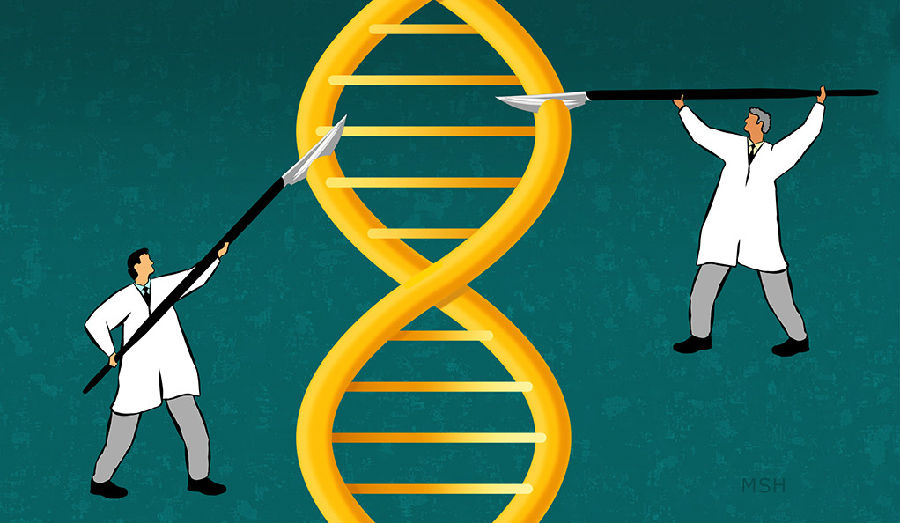Nor did the procedure fulfil any unmet medical need. For the child whose genome was edited to confer resistance, the claimed benefit is protection from a virus that she may never encounter (although her father is HIV-positive, his sperm were washed to prevent infection during fertilisation) and for which there is a good, and improving, standard of care. If the reports are correct, the second child has been exposed to the potential risks of an edited genome but can still be infected by HIV.
此程序也未能滿足任何未知醫(yī)療需求。對于為產(chǎn)生抗性而進(jìn)行基因編輯的孩子來說,宣稱的好處是可以預(yù)防有可能一生都遇不到的病毒(盡管他的父親HIV檢測呈陽性,但為防止受精過程的感染其精子已經(jīng)過清洗),還有優(yōu)質(zhì)并不斷提高的護(hù)理標(biāo)準(zhǔn)。如果報(bào)告正確,第二個(gè)孩子已經(jīng)暴露在編輯過的基因組的潛在風(fēng)險(xiǎn)中,但仍然可能感染艾滋病毒。

The idea that one scientist could make the leap towards editing reproductive cells has been condemned, but it has not been ruled out. Even if Mr He turns out to be a fraud, others have the means, the motive and the opportunity to do similar work. CRISPR is not a complex technology. That leads to two responses.
一位科學(xué)家可在編輯生殖細(xì)胞方面取得很大進(jìn)步的這種觀點(diǎn)遭到譴責(zé),但并沒有被完全否定。即使賀建奎欺詐,其他人還是有方式、有動(dòng)機(jī)、有機(jī)會(huì)做出類似的事情。CRISPR技術(shù)并不復(fù)雜。可有兩種應(yīng)對辦法。
The first is practical: better oversight of places such as fertility clinics, where back-room genome-tinkerers may lurk. That applies not just in China, where Mr He has attracted vocal condemnation, but also in America, where IVF clinics could use greater regulatory scrutiny.
第一種針對實(shí)際:對生育診所等可能潛伏著幕后基因修補(bǔ)者的地方加強(qiáng)監(jiān)管。這不僅適用于賀建奎招致聲討的中國,也適用于試管嬰兒診所還需加大監(jiān)管審查力度的美國。
The second is proper debate about when gene-editing is warranted. Editing the unhealthy cells of those suffering from genetic diseases such as Duchenne’s muscular dystrophy and cystic fibrosis will alleviate their suffering. It is less clear when it is necessary to edit embryos, but Mr He’s experiment obviously fails the test. Fertility treatments already screen embryos for unwanted genes.
第二種是適當(dāng)爭論,主要關(guān)于基因編輯在何時(shí)恰當(dāng)需要。編輯那些患有杜氏肌營養(yǎng)不良和囊性纖維化等遺傳疾病的人的不健康細(xì)胞將減輕患者痛苦。何時(shí)需要編輯胚胎還不清楚,但賀建奎的實(shí)驗(yàn)顯然未經(jīng)測試。生育治療已經(jīng)在篩選多余的基因。
It may even be that editing will one day be used on embryos to enhance genomes (to make people cleverer, say), rather than to cure disease. But that requires regulators, policymakers, scientists and civil society to think through deep ethical questions. Work is already under way to develop principles for editing reproductive cells. Earlier this year the Nuffield Council on Bioethics, a think-tank in Britain, outlined two: that the changes brought about by gene-editing should not increase “disadvantage, discrimination or division in society” and that such changes should not harm the welfare of the future person. Such debate was always going to be needed. Now it is urgent.
甚至可能某天,編輯技術(shù)將為增強(qiáng)基因(比如讓人變得更聰明)而用于胚胎,而非治療疾病。但這需要監(jiān)管機(jī)構(gòu)、政策制定者、科學(xué)家和公民社會(huì)深入思考倫理問題。編輯生殖細(xì)胞的原則制定工作已經(jīng)開始。今年早些時(shí)候,英國智庫納菲爾德生物倫理委員會(huì)概述了以下兩點(diǎn):基因編輯帶來的改變不應(yīng)增加“社會(huì)中的劣勢、歧視和分裂”,而且這種改變不應(yīng)損害未來人的福祉。這種爭辯總是有必要的。現(xiàn)在已是機(jī)不容發(fā)。
譯文由可可原創(chuàng),僅供學(xué)習(xí)交流使用,未經(jīng)許可請勿轉(zhuǎn)載。












